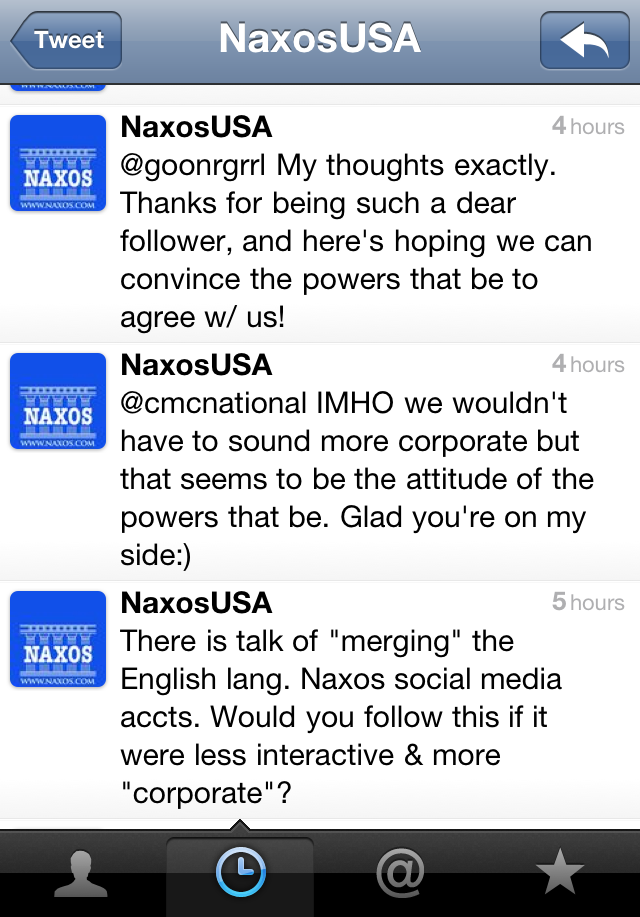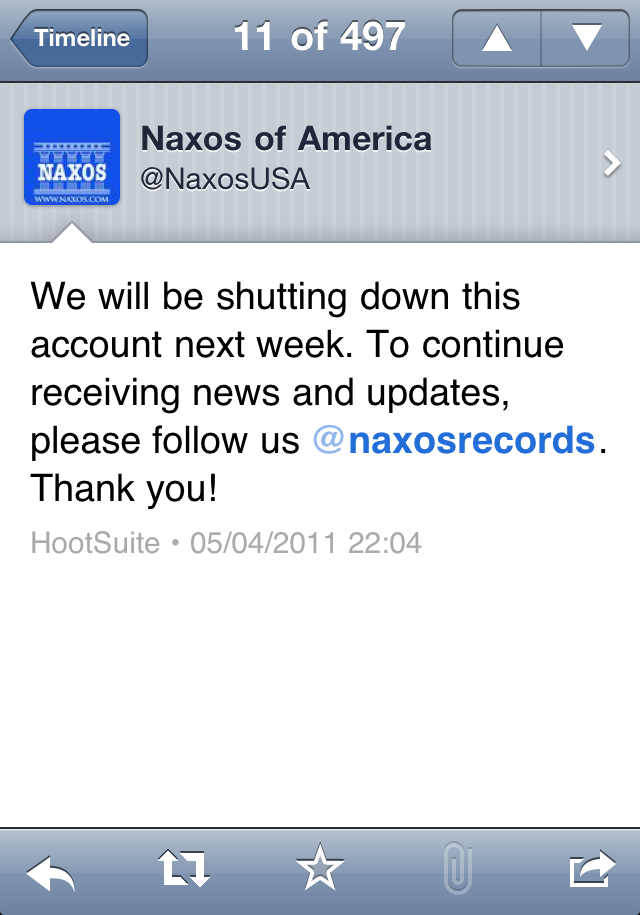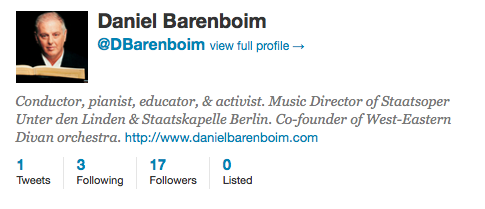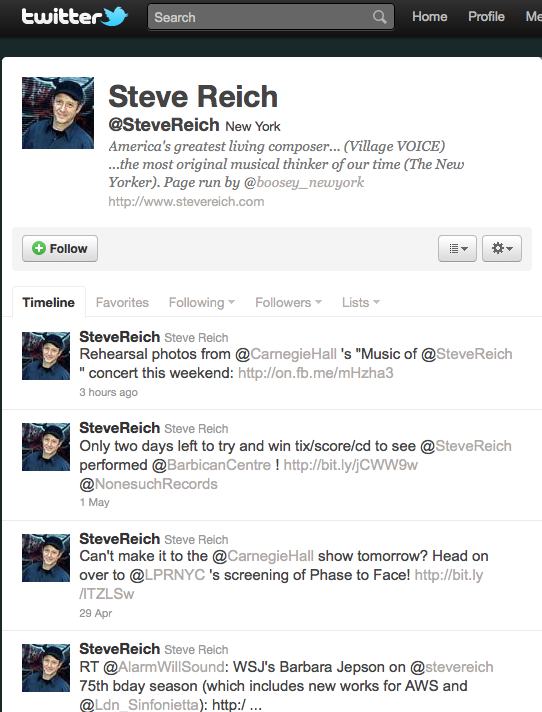Time and time again, we read that the key to social media “success” is to be more personal. Whether or not that success can be defined remains up for debate, but we do know that readers want to hear from real people on social media. Here are two recent posts on the topic:
The first is from MediaBistro, and details an experiment conducted by a professor. Will students enjoy her course more if they feel they “know” her from her Twitter account?
Kirsten A. Johnson, an assistant professor at Elizabethtown College, was curious about how her tweeting affected her credibility in the eyes of her students. Mulling this question, her academic instincts kicked in and she designed an experiment to test it.
Working with one of her students, she created three fictional “professor” Twitter accounts (creatively named Caitlin Milton, Caitlyn Milton, and Katelyn Milton). One account was filled solely with personal tweets like her morning workout routine, another stuck to academics, and the third combined both.
And guess which one the students trusted more? Caitlin number one, the personal professor.
Polling 120 students who had been following these Twitter accounts, Johnson found that the personal professor rated highest across competence, trustworthiness and caring, which she took to add up to credibility.
Johnson believes that students trusted the personal professor more because of their desire to create a bond between themselves and their professors. By tweeting about her personal life, “Caitlin” appeared more like a real person than the other professors.
A second post that caught my eye over at Asking Audiences (via the terrific You’ve Cott Mail) describes a cocktail party at which you’re chatting with friends and strangers and then all of a sudden one of them offers you a blow dryer. The writer explains that this is the equivalent of a Twitter feed or Facebook page trying to sell you something.
By the tenth time he tries to sell you a blow dryer, you scream at him that you do not want to buy his blow dryer, you will never buy his blow dryer, you will tell your friends not to buy his blow dryer, and you finish by explaining to him, in no uncertain terms, precisely what he can do with his stupid blow dryer.
You are officially not having fun at this soiree.
If social media is supposed to be personal, how do you use these outlets to promote an organization? Everyone thinks they “should” be on social media sites, as their mouths salivate thinking about the number of people using the outlets, but how does an organization or a company keep things both official and personal?
The Metropolitan Opera does an especially good job with their Twitter account. They provide news–season announcements, cast changes, Glee is filming in the Lincoln Center Plaza (very important!)–and retweet Tweets from folks about goings-on at the Met. Oh look, here’s something nice about Sondra, right up top (and un-planned!):
The Met doesn’t post their reviews, and they don’t post ticket discounts. I don’t think I have ever seen them link to the box office section of their website, actually. When I Tweeted at them that I felt like Jennifer Connelly in Labyrinth trying to find the stage door with all the construction last season, they responded something like, “We know! We have to deal with it every day!” It was chatty–clearly a real person–not the company line about how long the construction will take.
In early April, I noticed that @NaxosUSA, told their followers that the powers-that-be were making them merge several existing Naxos Twitter accounts into one. Whoever was running the feed took it to the people, as it were.
How enlightened! I thought; Naxos lets the person who runs their Twitter feed publicly complain about management?
About a day later, the Tweets above were taken down, and this was posted:
I wonder if that Damn The Man Naxos Tweeter lost his or her job. You expect someone to build a personal relationship with followers on behalf of an organization, and they end up feeling more allegiance to their followers than they do to that organization! Naxos, of course, wanted to consolidate their Twitter feeds to stay on message. The problem is, the entire function of Twitter is to be off message.
Today whilst messing around Twitter, I noticed this Tweet:
Now, I don’t know Daniel Barenboim, but I’m sure he’s an intelligent man. If this truly was “his” first Tweet, would he refer to himself by his own last name? Nowhere in his Twitter bio does it say this is a news feed for Daniel Barenboim, so we’re being led to believe this is actually the maestro Tweeting.
Three other feeds that speak on behalf of artists and do clarify that the feeds are not coming from the artists themselves are those for Gustavo Dudamel, Dmitri Hvorostovsky and Steve Reich.
If Gustavo Dudamel were to actually Tweet, I assume he would do it in Spanish. At least this bio says “official Twitter news feed.” Why it’s not @DudamelNews or @DudamelUpdates I don’t know. Seeing his name (@GustavoDudamel) like he’s supposed to be talking and then “Dudamel” as the first word of every Tweet is confusing.
…and Dmitri would probably Tweet in Russian. Actually, his bio just says the “official twitter feed,” so it’s not entirely clear that it’s news or a fan feed.
My favorite, though, especially in light of the joke composer Twitter feeds, is Steve Reich (” “) on Twitter:
His bio says his page is run by his publisher, Boosey & Hawkes, but the tone is shockingly antithetical to what I, and probably a lot of people, think of when they think of our Dean of New Music.
Those of you who have met him: just try and picture Steve Reich saying this:
Does Steve Reich know, I wonder, that this is his Twitter persona?
I put this thought on Twitter myself this morning and got this response:
It’s not “so bad” depending on what those in charge of it think Steve Reich’s image should be in 2011. Are they trying to present him as a tech-savvy, smiling guy? Make him appeal to the younger set, one emoticon and exclamation point at a time? What’s the Big Picture plan for Steve Reich, and how does the tone of his official Twitter feed fit into that? It is “clear it’s NOT Steve,” but when his name–and Dudamel’s, and Barenboim’s, and Hvorostovsky’s names–comes up in one’s Twitter feed, it reads like it’s them. Would you put emoticons and multiple exclamation points in a press release? If his Twitter feed is essentially a series of mini press releases, then what are they doing in there?
Is a news feed, an “official” Twitter feed, better than no Twitter presence at all? Sure, a many people, myself included, get a lot of their news (industry and mainstream alike) from Twitter. I do feel that, as a publicist, we should be giving people information where they are already looking for it, be that Twitter, Facebook, blogs, RSS feeds, or regular old newspapers. Bring the water to the horses, as I’ve said on this blog before. Where I have a problem, though, is trying to cram every outlet into the exact same message. Would it not be better for whoever is running these official Twitter feeds to ask their artists for actual Tweets or messages every once in a while? Or to do what Janet Jackson’s Twitter feed does, and clarify when it’s her and when it’s the team. Example via @SamNeuman, whom I hesitate to link to because he’s funnier than I am:
I also don’t buy this argument that artists have time or they don’t.
Neil Patrick Harris Tweets (and he’s a father of twins!).
It doesn’t take time if it comes naturally. I–not a Hollywood actor, not a father of twins, but busy enough–have never thought, “Well shoot, I was too busy to Tweet today. I had a lot to say, but the day just got away from me.” If it comes naturally, you just do it. Why I can’t remember to drink more water every day like I’m supposed to, I do not know. Daniel Barenboim, Gustavo Dudamel, Dmitri Hvorostovsky, and Steve Reich are all to busy to give us a quick, 143-character message every once and a while? Even if they don’t put paw to the keyboard themselves?
I’ll end with a fun and festive story for you all. My client, Gabriel Kahane, has his own Twitter feed. I didn’t tell him to start it, and I don’t tell him what to post. He can Tweet at New York Times and New Yorker writers directly. Does it make my little publicist heart flutter that he can say whatever he wants, to whomever he wants? Sure, but if people don’t like him in the most direct form of him, no pretty article I set up is going to change that. Perhaps that is another blog post for another time. At least if an artist puts something on Twitter, he/she can’t be misquoted!
Back in March, Gabriel Tweeted this, and I thought nothing of it.
This is the world we live in: Nico tells the internet that the New York Philharmonic’s website looks like a tampon ad, and they commission him anyway.
Gabriel’s manager and I received an e mail from a representative for the 92nd Street Y informing us that their office and the Y thinks Gabriel’s Tweet is, and I quote, “misguided and ill-advised.” The e mail also tells us this Tweet is especially surprising since Gabriel’s father will be performing at the venue.
“Ill-advised”? He wasn’t advised. “Misguided”? He wasn’t guided. Here was my response:
I was surprised to receive this e mail from you of all people, since I thought you valued the kind of discussions Twitter can generate in the current media climate. In fact, I see your Twitter handle right there in your auto-signature. As his publicist, I found Gabe’s Tweet neither misguided nor ill-advised. Season programming in New York is the hottest topic out there; since both you, personally, and the 92nd Street Y have Twitter feeds, frankly I wonder why you didn’t seize the opportunity to publicly engage in the dialogue with Gabe and defend your season!
I received no response, and my question remains: why would the 92nd Street Y bother to have a Twitter feed if they have their people officially policing Twitter comments rather than simply engaging? Once you’ve put yourself on Twitter, you need to be able to have the conversation in that world, and not take it offline when it becomes slightly charged.

















Hi Amanda,
I feel that in the interest of full disclosure here I should say that I manage the twitter feeds for several artists mentioned in this post.
So now that that’s out of the way, I am going to have to respectfully disagree with you on several points. First though, let’s get the points where we agree out of the way.
Would I love it if every artist I cared about and wanted to follow on twitter went out and tweeted themselves – yes. I love getting updates from Debbie Voigt (full disclosure again, my employer represents her), and she loves connecting with her fans that way. Everybody wins!
But what to does an artist and their representation do when an artist doesn’t want to tweet? They certainly have the time in their day, but some artists just don’t want to be bothered, or don’t know technology that well. Out of the nearly 7 billion people on the planet, only 20 million of them are on twitter; clearly many people don’t want to tweet. In that case, is the better situation to simply ignore the medium of twitter, or to accept a less perfect option?
Well, let’s look at the “everybody wins” theory again, specifically with Dudamel. You’ll notice that the most recent tweet in your picture is about a free, on-demand recording of an amazing concert he conducted this year, which we felt his fans would like to hear. Would it be better for everyone to simply let this go unannounced to the legions of fans that Gustavo has around the world who don’t get to hear him perform nearly as much as they like? Because of that tweet, fans of Gustavo can now hear a great recording anywhere in the world. I think everybody wins in this situation.
Also, another issue to take into account is the very nature of social media. Twitter, Facebook, RSS feeds, e-Newsletters and the like are all opt-in services. There is no spamming or deception in any of the work that we do for our clients in the digital realm, and if someone decides that they no longer want to receive information about Hvorostovsky, the can simply unfollow. In my time at my company, I have never received a message from a follower that was unhappy about the activities that we undertake on behalf of our clients, but I have received many thanking us for the information.
Now, you mention talking to the artists about what they would like to tweet about, and then tweeting it for them. I should say that every tweet, facebook post, or news update we put out for any client of ours goes through them before it is posted. The artist has the option of being as involved as they would like, but they are always informed about what we are putting out on their behalf before we do it.
Now, signing each tweet is a great idea for accounts that are shared, as in the example with Janet Jackson. But for an account that is solely created as a third person, official but not personal account, is it really necessary to use those precious characters out of the allowed 140? Perhaps the best situation would be to have Twitter create a designated something akin to Facebook’s “Fan Page”, so that there is no chance of confusion!
Anyway, I could go on and on, but there’s one last thing I want to clear up. In my tweet about Barenboim this morning, my comment was referring to the incredible news contained within the tweet, and not the tweet itself. For Barenboim to travel to Gaza as an Israeli, this week of all weeks, in the name of peace is an incredible commitment both to his art and to the peace of the people in that rather volatile region. I guess I should have been more clear, but ya know they only give you those 140 darn characters! Sorry for any confusion.
Cheers,
Devon
>>> But for an account that is solely created as a third person, official but not personal account, is it really necessary to use those precious characters out of the allowed 140? <<<
Chris is pretty sure tweeting in 1st person would actually save 4-5 characters per pronoun!
And not sound so much like Elmo!
Absolutely Chris, but tweeting in the 1st person would require impersonating the artist, and that’s a little shady. People do it, but I personally think it’s a bit dishonest to impersonate an artist, which is why the third person is a little better. It’s not perfect of course, but better than impersonation in my eyes.
Twitter? Oh the inanity
Hi Devon, I’m curious, how do the Twitter feeds your company manages fit in with your larger PR strategy for these artists? Basically, your company sees Twitter as another form of press release? So, as Gustavo Dudamel’s publicists, for example, do you send out press releases at the same time as you put information on Twitter? Or do you skip press releases all together? Thanks for the clarification. Interesting discussion!
I do enjoy Met Opera’s tweets. Chatty and human, witty, plugged in.
It’s a balance between being a part of the conversation, a glimpse into the personality of the artist/organization and being a resource. I think we diverge on this point: I wouldn’t mind if the Met linked to their box office, because, in the end, I like going to the opera, and that’s why I’m following them. I’ll accept that from an artists’ Twitter account — endless talk of what they’re eating and in which country (kind of interesting unless it’s too precious) — but an annoying missed opportunity if they don’t tell their fans anything useful like “I’m playing in Boston next week, if you want to get tickets they’re here: HYPERLINK.” From an organization I absolutely expect that. Chat with me, make me laugh, tell me who just said what backstage, but if you don’t tell me what’s going on and where to get tickets, buy the recording, or see the cool content you’ve been producing, then you’re not a useful resource.
I like the Toronto Symphony feed quite a bit. I think they’ve got it just right (as with most else they do. I’m a big fan). http://twitter.com/#!/torontosymphony
(Sidebar in regards to the @SteveReich account:
Some context: that account was started by a young composer in the UK who was impersonating Steve, leading many of Steve’s professional and personal acquaintances to believe it was actually the composer behind the curtain. Those followers began to suspect it wasn’t him and formed an angry Twitmob, coming to me in my former role at Boosey & Hawkes, in order to resolve the situation. I contacted the guy through Twitter and told him it was cool to keep the handle (artists have no legal right to their handle) but it needed to be abundantly clear in the bio and tweets that this was either a parody or fan account. We even offered to work with him and give him inside info, if he wanted to be Steve’s official Twitter street team. But I think he was too spooked by all of the Twitter rage among fans, so he handed over the password and the account became ours.
I talked to Steve about Twitter, showed him some feeds, searches. He thought it was an interesting development but he passed on running the account because it just wasn’t his thing. Very happy with how he spends his time, he said he “finally figured out how to write Steve Reich’s music” and was on a roll. That left us with thousands of disappointed Reich followers, so we told them what was up and we decided to run a contest for hotel + tickets to the world premiere of 2×5 as a way of saying thanks for following. It made at least one Dutch woman extremely happy when she came, met Steve, etc. I’m no longer authorized to speak for Reich or Boosey, but I assume they’re continuing in that way with the current contests. History, FWIW.)
Fascinating article. I’ve unfollowed quite a few bands, artists, labels & venues that tweeted incessantly.
(I am _not_ talking about when someone actually COMPOSES a tweet with venue info, preferably at-mentioning anyone involved, rather than the 47 Facebook-linked updates. Come on, sell it to me, don’t spoon-feed it to me.)
Far more likely to invest in someone’s music and go see them live if I can see that they’re people with personalities.
At this point, Gabriel Kahane or Nico Muhly or Chris Thile or Rob Moose just MIGHT be able to sell me a blow dryer, because they’re amusing and interesting and who knows, there might be a good reason for their new careers in blow dryer sales, and after all, I might need one. One is already on the hook, as it were.
Seriously, though, you brought to mind Brendan Benson’s feed. His team posts the interesting stuff, and when a tweet is identified as coming from Brendan himself it’s usually “please come to this gig”.
This is all still unbroken ground for many, many artists/entities. I would not point the “generational” finger, but I would lay money that the 92Y representative you mentioned is over 40. Hopefully as more people become comfortable with this medium of communication, we can all loosen up a little and interact more.
Great article, thanks. I especially appreciate the reminder that Twitter should serve as part of an overall strategy for communicating with our various friends and fans, and that it can’t be all things to all people.
Trackback! Very well-written and researched. Now I have to go through my list of people I follow and weed out the celebrities among them who may not actually be doing any authentic tweeting.
I think the exception is stars like M.I.A. – she only tweets when something is really happening or she has a link to a particular cause or concern.
http://dave-lucas.blogspot.com/2011/05/who-is-twitterer-behind-tweet.html
Hi everyone
Quite interested in this discussion, as we run a PR company too and I actually advise a lot of my artists against Twitter.
Twitter is meant as an interactive tool, to discuss , share and forward little snippets from the artist life. If I wanted another newsfeed I go to a fanpage on Facebook or their website. I always think there should be something personal and involved from an artist on Twitter.
I think Hilary Hahn does a fantastic job on Twitter, tweeting as her violincase but keeping her privacy as an individual.
Artists who dont want to get involved at all in Twitter, I advise against it.
The way Devon Estes and his company (21C Media Group in New York City says Google) are Tweeting for their artists makes me want to quit Twitter. If Devon Estes Tweets as “Daniel Barenboim” and then retweets his fake Barenboim Tweet as himself, and compliments his own Tweet as fake Barenboim–“One hell of a first tweet”–then we’re dealing with quintessential PR bullshit, here. Just recycling nothingness in lame attempts to promote clients. The essence of PR bullshit. (Amanda, can we swear in the comments?)
Daniel Barenboim, wise up and lose these people!
“I talked to Steve about Twitter, showed him some feeds, searches. He thought it was an interesting development but he passed on running the account because it just wasn’t his thing. Very happy with how he spends his time, he said he “finally figured out how to write Steve Reich’s music” and was on a roll. That left us with thousands of disappointed Reich followers, so we told them what was up and we decided to run a contest for hotel + tickets to the world premiere of 2×5 as a way of saying thanks for following. It made at least one Dutch woman extremely happy when she came, met Steve, etc. I’m no longer authorized to speak for Reich or Boosey, but I assume they’re continuing in that way with the current contests. History, FWIW.)”
Steve needs to be more presidential. Call whomever is in charge of the feed, ask what new, interesting, controversial, or whatever. Look, at his age and with his involvement he should realize he is a business and it might require 30 minute max in his day. One less trip to Starbucks or even do it while sipping a latte. Even Beethoven had that perspective. If Beethoven were alive I venture to guess that his would be one of the most engaging Twitter feed on the planet.